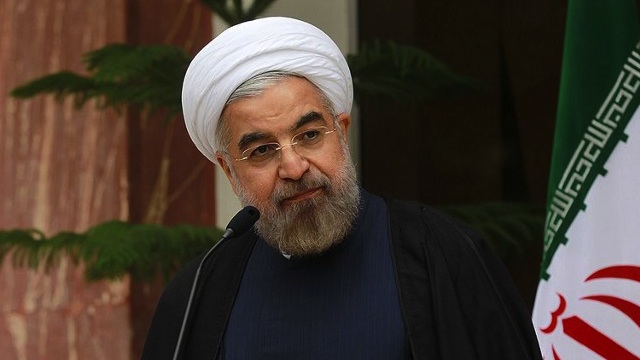SUMMARY
This is AI generated summarization, which may have errors. For context, always refer to the full article.

TEHRAN, Iran – Iranian President Hassan Rouhani’s cabinet marked its 100th day Monday, November 25, riding the success of a landmark nuclear deal that has for now vindicated his push to engage with the West.
Backed by supreme leader Ayatollah Ali Khamenei, Rouhani embraced the agreement as a victory that has forced the world to recognize Iran’s nuclear “rights” and chipped away at international sanctions.
“The sanctions regime will begin to shatter with the (implementation) of this agreement,” Rouhani said of the six-month deal that aims to buy time for clinching a comprehensive accord.
Under the deal, Iran agreed to limit uranium enrichment and curb expansion of its nuclear drive in exchange for relief from punitive sanctions and the release of some of its frozen assets.
The deal marks a major, early achievement for Rouhani, who won a first-round electoral victory over a pool of conservatives this year by vowing a more diplomatic approach to the West after eight years of stalled talks and escalating sanctions under his hardline predecessor, Mahmoud Ahmadinejad.
Afshon Ostovar, an analyst at the US-based CNA research center, attributes Rouhani’s success to the realistic expectations of his negotiators and the support of Khamenei.
Rouhani and Foreign Minister Mohammad Javad Zarif, who took part in the Geneva talks, “knew what could be achieved in negotiations with the West and what could not,” he said.
Breaking taboos, mending ties
The nuclear deal came against the backdrop of a sharp turn by Rouhani away from the hostility that has often marked Iran’s relations with the West since the 1979 Islamic revolution.
In New York for the UN General Assembly in September, Rouhani condemned the Holocaust as “reprehensible” after Ahmadinejad had long dismissed it as a “myth”.
He also broke a taboo by holding a direct telephone conversation with US President Barack Obama – the first time leaders of the two countries had spoken since 1979.
The face-to-face meeting between Zarif and US Secretary of State John Kerry in New York was also remarkable, and yet in the two months since then the diplomats have spent hours together.
On Sunday, November 24, a US official said envoys had held “some limited bilateral discussions” since September in addition to the nuclear talks with the P5+1, which also includes Britain, China, France and Russia plus Germany.
The increased contacts have raised the possibility of a wider rapprochement between Washington and Tehran, fuelling concerns among Iran’s hardliners and in Israel and Saudi Arabia, US allies who still view Iran as a regional menace.
Israel and Western nations have long accused Iran of seeking a nuclear weapons capability, charges denied by Tehran, which insists its uranium enrichment program is for purely peaceful purposes.
Analyst Mustafa Alani, of the Geneva-based Gulf Research Center, said Arab monarchies were aware of back-channel negotiations between Washington and Tehran and “were not content”.
Khamenei, while backing Rouhani’s nuclear negotiators, has raised concerns about the wider diplomatic push, saying at the time that “some of what happened in the New York trip was not appropriate,” without elaborating.
The supreme leader has also continued to wage a war of words with Israel, declaring last week the Jewish state was “doomed to collapse”.
And it remains to be seen whether Iran’s charm offensive will work closer to home.
“Rouhani will probably want to improve relations with Saudi Arabia and other Arab states. Although this is unlikely to happen so long as Tehran and Riyadh continue to be engaged in a proxy war against each other in Syria,” Ostovar said.
Iran is a key ally of Syrian President Bashar al-Assad’s regime, while Saudi Arabia, most Arab states and the West support the Sunni-led rebels struggling to topple him.
“Syria will be a secondary issue, but it is unlikely that much traction will occur on that front so long as all sides in the conflict remain unwilling (to reach a) serious compromise,” said Ostovar, adding the nuclear issue would “remain central until it is solved”.
Amnesty International said that with the nuclear deal agreed, Rouhani should now fullfil campaign promises to improve human rights neglected in his first 100 days in office.
“For years, Iran’s human rights situation has been overshadowed, both internationally and at home, by discussions about the country’s nuclear program. Now that an agreement has been reached, there must not be any more delays in addressing Iran’s dire human rights situation,” it said. – Rappler.com
Add a comment
How does this make you feel?





There are no comments yet. Add your comment to start the conversation.